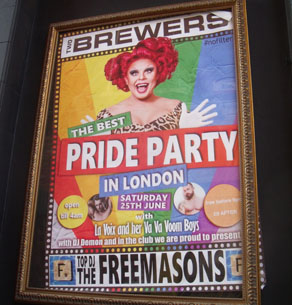How businesses and police and others have come together on Clapham High Street to reduce crime and disorder – because it’s in everyone’s interests, besides local residents who were complaining of noise and nuisance – featured in the September 2016 print issue of Professional Security magazine, after we were a ‘fly on the wall’ at a Friday night briefing for businesses. At the London business crime reduction conference on November 16 at the Hippodrome, James Lawley-Barrett, of the Safer London business partnership, reviewed the work.
That south London high street had become saturated with bars, and saw a lot of complaints by locals about the resulting anti-social behaviour. Lambeth Council commissioned a report by the trade body the ATCM in 2013. The alcohol-related trouble affected others wider afield; as each end of the street has a Tube station, Transport for London was finding the area a hotspot also. When pubs closed, there was a lack of ‘capable guardians’ on the high street. Police were reactive, rather than proactive. Businesses were not working together, although they managed drinkers inside their venues well enough.
The Clapham business improvement district (BID) decided on funding, providing uniforms for and equipping with body-worn cameras private security wardens, as ‘capable guardians’, that James described as the ‘glue’ that brought the partnership work together; which also included more use of radio links and pubwatch, and police using dispersal powers 9and with the radios, door staff and others could pass on details and be alerted to people repeatedly ‘dispersed’ but not obeying the orders, and going back for more drinks or trouble). Breathalyser kits were tested with success to combat ‘pre-loading’; that is, people drinking from supermarkets and off-licences and being drunk even before they reach pubs and clubs.
The role of the Safer London is to provide the briefings, and the bespoke reports on offenders, so that those who attend the meetings at the start of a Friday night know who are causing issues, and so the venues can turn them away. Joint patrols by police and local government licensing staff check known ‘problem premises’. It’s not all about security and countering crime; on the theory of ‘broken windows’ (if a place has graffiti and vandalism and literally broken windows left unrepaired, it can lead to crime and fear of crime, by making wrong-doers feel an area is ‘fair game’), the This Is Clapham BID also carry out street cleaning. The results; less reported crime and anti-social behaviour, and fewer ambulance call-outs. The wardens support vulnerable females; and have confiscated 1400 bottles of alcohol.
James did point to the need for a ‘framework of assessment’; that is, to keep the partnership work going and under review, to counter the transient nature of the actual security, community safety, police and other personnel who are on the ground.
Picture; ‘Pride Party’ sign, Clapham High Street, summer 2016.










